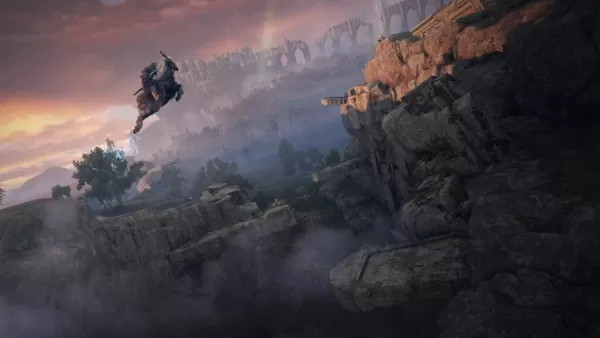Elden Ring: Redefining Open-World Exploration?
Open-world games were once dominated by a relentless focus on checklists. Maps were littered with markers, mini-maps dictated every move, and objectives often felt more like tasks than adventures.
Then came Elden Ring from FromSoftware, which tossed aside the conventional playbook, eliminated the hand-holding, and offered players something truly unique: genuine freedom.
We've collaborated with our partners at Eneba to delve into what Elden Ring has brought to the genre, and why it's a game-changer.
A World That Invites Rather Than Demands Attention
Traditional open-world games crave your constant attention. Pop-ups incessantly prompt you on where to go, what to do, and why it matters. Elden Ring takes a different approach—it speaks softly. It unfurls a vast, enigmatic world and encourages you to explore it on your terms.
There are no overbearing UI elements vying for your attention; instead, your curiosity leads the way. If a distant landmark catches your eye, venture towards it. You might uncover a concealed dungeon, a formidable weapon, or a monstrous boss eager to challenge you.
The beauty of it? No level scaling. The world remains unchanged, forcing you to adapt. If a region proves too tough, you can return later—or not. Nothing stops you from attempting to battle a dragon at level five with a broken sword, though the outcome might be predictably fiery.
It's never too late to delve into the Lands Between, especially when you can snag an Elden Ring Steam key at Eneba for less than you might think.
Exploration as Genuine Discovery, Not a Checklist
In many open-world games, exploration often feels like a race against time, dashing from one marker to the next, checking off tasks like a to-do list. Elden Ring turns this notion on its head.
There's no quest log spelling out your next move. NPCs deliver cryptic messages, distant landmarks beckon without explanation, and the game never pauses to clarify things.
 This might seem daunting, but it's what makes exploration so gratifying. Every cave, ruin, and fortress feels like a personal discovery. You ventured there out of curiosity, not because you were directed.
This might seem daunting, but it's what makes exploration so gratifying. Every cave, ruin, and fortress feels like a personal discovery. You ventured there out of curiosity, not because you were directed.
Moreover, unlike games where loot feels arbitrary, Elden Ring ensures every reward is significant. Stumble upon a hidden cave, and you might emerge with a game-altering weapon or a spell capable of summoning a meteor storm.
The Thrill of Getting Lost (and Surviving)
Most games view getting lost as a setback. In Elden Ring, it's part of the adventure. You might take a wrong turn into a poison swamp (a staple, of course). You could wander into what seems like a tranquil village, only to be ambushed by nightmarish creatures. Yet, these moments breathe life into the world.
The game doesn't guide you by the hand, but it does drop hints. A statue might gesture toward a hidden treasure. A cryptic NPC could hint at a lurking boss. If you're observant, the world subtly directs you without dictating your path.
Will Open-World Games Ever Be the Same?
Post-Elden Ring, there's no turning back. FromSoftware has demonstrated that players don't need constant direction to relish an open world—they crave mystery, challenge, and the exhilaration of discovery. We can only hope other developers are paying attention.
If you're eager to immerse yourself in a world that not only encourages but demands exploration, digital marketplaces like Eneba offer incredible deals on gaming essentials. Whether it's Elden Ring or other must-play titles, your next adventure is just a few clicks away.
Latest Articles












![Roblox Forsaken Characters Tier List [UPDATED] (2025)](https://images.dyk8.com/uploads/18/17380116246797f3e8a8a39.jpg)


















